
 |
||
| The healthy secret of red wine. Scientific knowledge about wine (Vitis vinifera L.) |
||
| Red wine polyphenols are strong antioxidants The vital ingredients of red wine, in particular the polyphenols (1), belong to the strongest antioxidantive substances known in the nature. They exceed the effect of vitamin C around the 50-fold. They are able efficiently to intercept free radicals and, therefore, to prevent oxidative stress. |
||
French paradox In fact, according to data from the British Heart Foundation, in 1999, rates of death from coronary heart disease among males aged 3574 years was 230 per 100,000 people in the US but only 83 per 100,000 in France (3). The average French person, however, consumed 108 grams per day of fat from animal sources in 2002 while the average American consumed only 72. The French eat four times as much butter , 60 percent more cheese and nearly three times as much pork (3). For a long time, it was impossible to explain why, in France , the risk of myocardial infarction for men and women between 40 und 69 years is just half the risk obtained for people in other European countries. A study of the World Health Organization (WHO) contributed to the term French Paradox (4). Since 1992, this paradox can be regarded as solved. The French scientists Renaud and de Lorgeril discovered that the regular moderate consumption of red wine is associated with a preventive effect on the cardiovascular health. In further studies, this could be confirmed (1,5). |
||
How red wine supports health
So, epidemiological data clearly show that the frequency and the cardiovascular mortality are lowered by the consumption of red wine (1). Red wine polyphenols also prevent the oxidation of "bad" LDL cholesterol. The polyphenols stabilize and protect the walls of the smallest blood vessels and improve therefore the so-called microcirculation. This can have, e.g., in the eye immediate positive results, while the night vision is improved (5). Red wine also supports digestion, improves the production of bile a nd gastric juice and and raises the fat removal through the bowel (5). Red wine contains on average about 15 times more polyphenols than white wine (5). The mean polyphenol content of red wine is given in the scientific literature with 70.2 mg / litres (6). Fig. Red wine has strongest antioxidative effect (TEAC) among all wines (2). |
 Fig. With rising polyphenol content of the wine the antioxidative effect increases ( Trolox equivalent antioxidant capacity (TEAC) (2). |
|
The problem of alcohol Wine has usually an alcohol content between 8.5 and 14 vol %, and a lcohol damages the liver, the brain and the heart from certain amounts. A daily consumption of alcohol is considered moderate and relatively safe for healthy men up to 40 g, and for healthy women up to 20 g (7). Newer data show, that health risks can arise with clearly lower alcohol amounts. Therefore, the liver-toxic threshold, was recently lowered to just 24 g per day for men and 12 g for women (8). Thus, already ¼ l of red wine daily can cause damages. Alcohol is further a so called cocarcinogen. All this, unfortunately, limits the "use" of regular red wine as a valuable, natural source of wine polyphenols to relatively small quantities. Alcohol-free food supplements containing the original, natural polyphenolic ingredients of red wine offer a convenient opportunity to take health profit from these valuable vital ingredients of the red wine. They are based on red wine extracts and contain red wine polyphenols, however, completely without alcohol. The dietary and physiologically desirable effects of the red wine on ageing processes, cardio-vascular system, healthy performance and vision, particularly by the reduction of oxidative stress can be caused therefore without alcohol load. The servings per day may contain the health-supporting polyphenols from up to ½ bottle of red wine. |
||
|
||